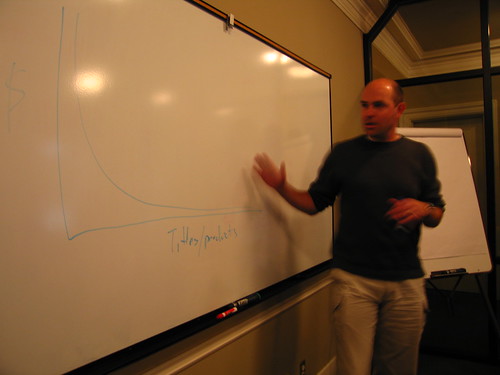From September 2005 to June 2006 a team of thirteen scholars at the The University of Southern California's Annenberg Center for Communication explored how new and maturing networking technologies are transforming the way in which we interact with content, media sources, other individuals and groups, and the world that surrounds us.
This site documents the process and the results.
categories
jbleecker's blog
Receiver #14 Out — Thanks Vodaphone
Vodaphone's excellent series of insightful, culturally-aware essays on the mobile society has just released Issue #14. Pick it up..it's free!
Issue #14
---------
Mobile services are constantly breaching new boundaries, and will have an enormous impact on the logistics of life — both in terms of productivity and social networking. But the one most important basic feature will always be the ability to dynamically connect everybody with everybody else. So the question is: What do we want to bring together, exchange or take with us, and how can we do this when we're out in the field? This time around, receiver levels a look at applicability issues — how can we work, learn, cooperate and know better using mobiles?
Conference backchannels: distributed intelligence or divided attention
Nicolas Nova calls out this recent paper on "back-channels" at conferences.
Conference backchannels: distributed intelligence or divided attention:
Jacobs N, Mcfarlane A. (2005) Conferences as learning communities: some early lessons in using `back-channel’ technologies at an academic conference - distributed intelligence or divided attention? Journal of Computer Assisted Learning, Vol. 21, No. 5., pp. 317-329
Eyebeam reBlogger

I may slow down a small bit this next week or so — I'm going to be reblogging over at Eyebeam's reBlog err..blog.
I made a post that's on point with today's seminar http://archinect.com/news/article.php?id=28636_0_24_0_C
Chris Anderson - Resistance is Fertile
I blogged notes and commentary from Chris' discussion during the netpublics seminar and shorter notes from his public presentation downstairs.
I'll quote my sort of Talmudic meta-question:
Why do I blog this? The Long(er) Tail is a steamroller meme with lots of resonance and entirely legible in the context of digital dissemination networks. And the netpublics seminar I'm participating in is drawn to the topic of social formations that arise in the context of such dissemination and communication networks. I'm also made profoundly nervous by things that seem to absorb lots of phenomenon into a graph. But there are questions wanting here. For instance, what are the consequences for innovation? How does the Long Tail miss comprehending the circulation of culture? What is the limit of The Long Tail — when does it break down or skid off into the bushes? Where are the ethics of The Long Tail, particularly if it's easy to say that insurgency is The Long Tail of warfare? How can The Long Tail sustain itself when we make the safe assumption that the operators/aggregators at the head will behave selfishly to sustain their enterprises' influence, power and economies? What happens when the head (aggregators) eats the tail - why wouldn't that happen so that aggregators can reap more of the sum of the area below the graph? Finally, why do I get nervous that so much fits into that graph there?
Technorati Tags: Chris Anderson, The Long Tail
Teen Content Creators
Nicolas caught this relevant nugget — a recent report from the Pew Internet & American Life Project (what researcher wouldn't want to be a part of something with a name like that!) on teen content creators. I'm assuming these are digital kids kind of teen content creators.
Quote
Teen Content Creators:
The latest report from the Pew Internet, which deals with ‘teen content creators’, is very insightful. It reports that more than half of online teens have created content for the internet; and most teen downloaders think that getting free music files is easy to do
thx nicolas
Technorati Tags: digital kids
Response to Michael Liebhold on The Geospatial Web
I posted my remarks on Michael Liebhold's talk on The Geospatial Web here
Michael Liebhold Talk
Service Ecologies and The Geospatial Web
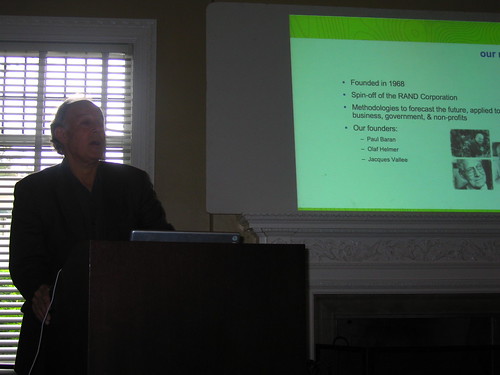
Mike Liebhold is here today to talk on the topic of the Geospatial web.
What does the IFTF do?Brainstorm through possible, plausible, probable and preferred futures. Present a context for understanding the future. Up to clients to develop insights based on the foresights. Foresight to insight actions is the operating principle of the company.
Research areas are sociological impacts of technology.
Some IFTF clients: AMA, Johnson & Johnson, Alstate, Intel, Pepsico, Lego, Kraft, Kodak, Honda, McDonalds.
Methodologies: Mapping, Ethnographic, Expert workshops & interview; Scenario development & analysis; Surveys & quantitative analysis (sort of..); content facilitation; prototyping/artifacts (building objects from the future.)
* US / ICANN vs ITU / UN
* The Chinese future of IPv6
* Economies of scale drive specifications
* The Golden Shield
What happens if the US holds onto ICANN and others want to split off the root server infrastructure?
What is the lesson here? Chinese are buying lots and lots of Nextel, etc., so they can influence technology design by virtue of their force in the economics of design — they can say what they'll buy and when they're buying lots of something, they can shape design and thereby create protocols or variations of protocols independent of task forces.
Platforms: P2P Networks
* Mesh Networks
* Automotive Nets
* Sensor Nets
* Self-configuring Nets
Trend in the future for web-like experiences out in the world. Leads to the Geospatial Web.
What is interesting here? Imaginary world draped over physical world. Long standing area of interest for Mike. Profound new kind of world wide web, hypermedia objects are not just identified by URI or URL but by spatial coordinates — lat/lon/elevation. What are these? Text objects; sounds; images. Enormous amount of cartographic data that should be viewed in situ. Invisible attributes become visible. Sentient landscapes. Context-aware computing. Geoweb Geospatial Ecosystem* Geolocation Techniques
** location-aware software (triangulation)
** location-aware devices (e.g. GPS)
** location-sensing networks (e.g. E911) What is interesting here? General concern with privacy, partially because there aren't open systems for these.
Placelab.org is an alternative, because it's open. Telco carriers have the location info, but they won't make it available because they want to charge you or worse. So the economics of that proposition are not compelling to end users who don't want to feel like they're getting nickel-and-dimed. * devices for augmented perception
** smart phones & PDAs
** automobile computers
** body extensions (pens, cameras, earphone rigs, pens) What is interesting here? Not at all clear how the device ecology will evolve. * location-aware services
** walled gardens (sadly..)
** carrier services
** enterprise servcies
** Google Earth
** MS Virtual Earth
** Sony XYZ — head-mounted video, dashboard graphics. What is interesting here? You may want to hold up a device to see things as you move around, rather than on a downward facing screen. Geoweb Software Industry Ecology
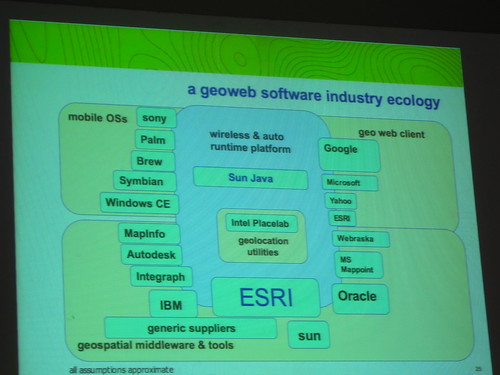 What is interesting here?Open mapping services allow you to import standard maps into Google Maps — detailed in new book called Google Map Hacks by O'Reilly.
an open software ecology
What is interesting here?Open mapping services allow you to import standard maps into Google Maps — detailed in new book called Google Map Hacks by O'Reilly.
an open software ecology
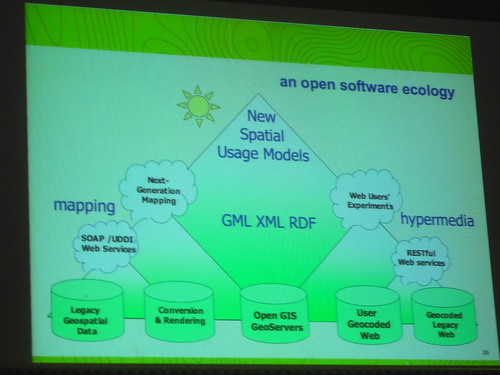 What is interesting here? There's a software ecology and an industry ecology and a bit of confusion amongst them. Or maybe it's that the two "ecologies" don't overlap in that the industry ecology does not open up their platforms to the software ecology. Walled garden problem.
geospatial policies
* contextual privacy
What is interesting here? There's a software ecology and an industry ecology and a bit of confusion amongst them. Or maybe it's that the two "ecologies" don't overlap in that the industry ecology does not open up their platforms to the software ecology. Walled garden problem.
geospatial policies
* contextual privacy* freely accessible geolocation APIs
* public geodata services What is interesting here? Interesting practices for creating geodata — individuals, local groups, creating their own maps through grassroot means, and spunky, hacky techniques such as walking/riding with GPSs. Same sort of way that NAVTEQ does, only open. Also, Institute for Applied Autonomy's iSee. Geodata Search * clearinghouses
* gateways
* repositories
* namespaces
* geoweb servers Integrated GIS & Web Hypermedia / Realtime Cubit Cartography
Usage: Computational Grids
* health mapping** epidemiological + environmental maps
** health resources
** risky places
** people at risk
* security
* Geo Demographics
** microzone advertising
* at-risk ecologies
** eco-tourism
** green mapping
** indigenous mapping
* path-making (capturing folkloric knowledge of a place)
* pixel views: fragmenting places and spaces (micro views into a farm field)
* ground truth: empowering people in place (creating your own community information and stories in place)
Technorati Tags: geospatial web, locative media, Service Ecology
Nabi International Workshop on Urban Play and Locative Media, Day 1
I've posted some notes from the first day of the Urban Play and Locative Media workshop on my blog.
Death to LBS?
I posted a brief note on LBS — Location Based Services — with a bit of inspiration from Russell Buckley's dispatch on the pathetic offerings recently announced for mobile phone-based LBS services from British Telecom.
It made me think of the door-before-the-house way of designing for social practices. When you put the meme-fetish-acronym du jour ahead of an appreciation of the practice you're supposedly designing for, you wind up with ATM finders.
Royal Grand Prix Derby Racing (On Air)
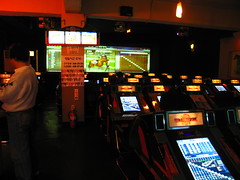
This is a pretty important netpublics theory object, I think. Discussed more fully here:
Royal Grand Prix Derby Racing (On Air) theory object.
.
.

